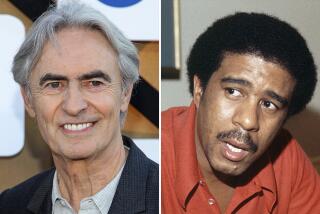Humor War : Americans Too Giggly, Russians Find
- Share via
WASHINGTON — Soviet humorists ended an extensive probe of U.S. laughter today, saying they believe Americans are too giggly.
They said they were surprised by the amount of laughing they encountered in a two-week tour and astonished by the depths of tastelessness plumbed by so-called black humor.
“We never considered America to be a nation of gloomy people. Now, as a result of our trip, we came to understand that they smile and laugh and giggle perhaps too much,” said Alexei Pyanov, editor of Krokodil, the Soviet Union’s most popular satire magazine.
Pyanov and four other Russians were sponsored for their tour by the Washington-based Workshop Library on World Humor, a private group. They participated in the Sixth International Conference on Humor in Tempe, Ariz., and university symposiums elsewhere.
“We came to know humor is very much here,” Pyanov said through an interpreter.
Another team member, Andrey Benyukh, deputy foreign editor of Krokodil, said he was shocked by jokes about handicapped people and AIDS.
‘Prefer Intellectual’
“I was astonished by jokes of sick or ‘black humor’ about physical disabilities or diseases. This kind of humor is not an optimistic one. We prefer more intellectual jokes,” he said.
Asked about his funniest experience in the United States, Pyanov described an incident in Philadelphia, where the visitors encountered some male models being photographed for shirt advertisements.
Striking a model’s pose with stomach pulled in, chest out, hands on hips and jacket pushed back, Pyanov showed how the group joined the models to advertise their own shirts.
“It was received very well,” he said. “Perhaps (because) we were not afraid to stand up with the Americans and show our goods.”
Unfortunately, he said, the visitors discovered later that one of their shirts had been bought in Disneyland.
More to Read
Sign up for Essential California
The most important California stories and recommendations in your inbox every morning.
You may occasionally receive promotional content from the Los Angeles Times.










